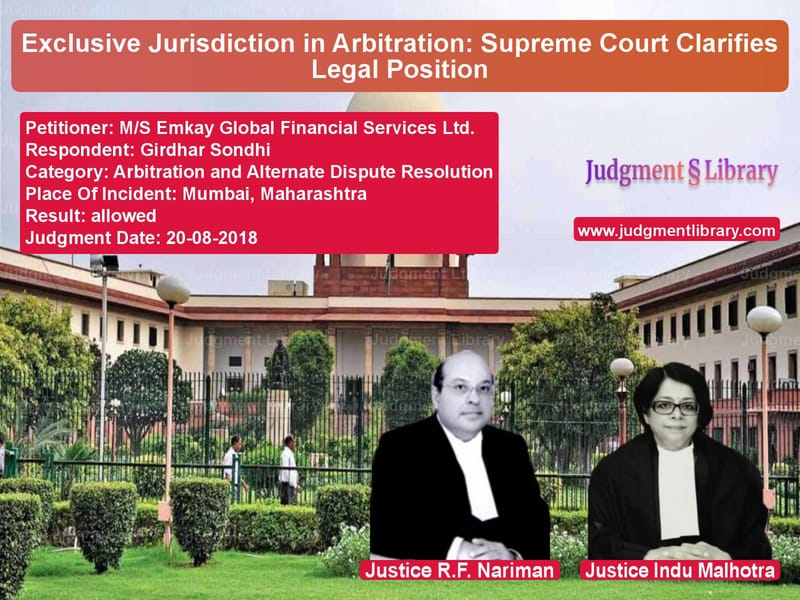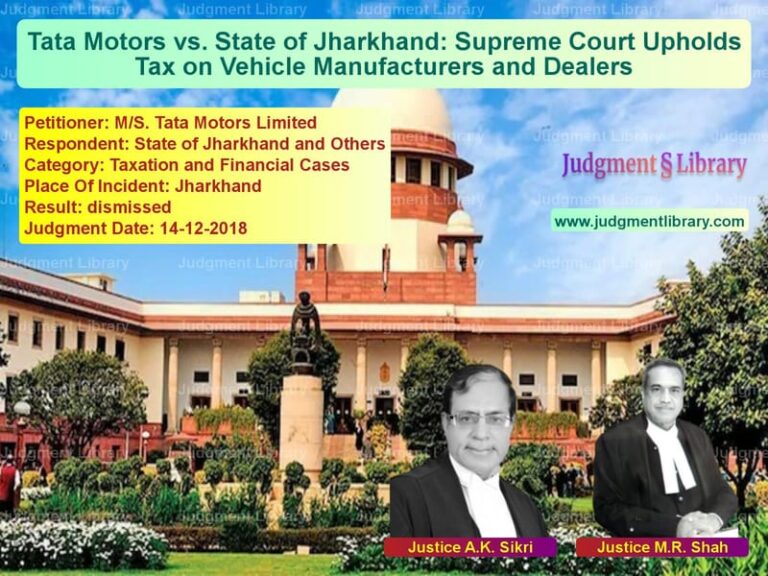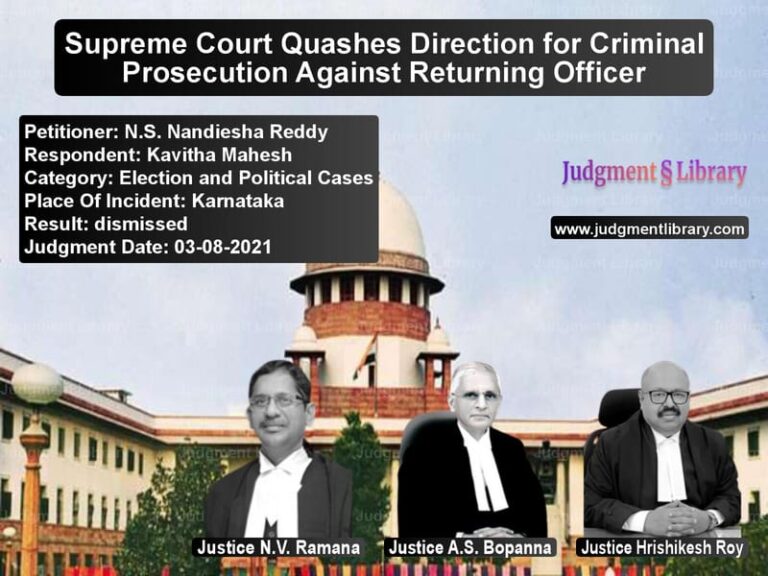Exclusive Jurisdiction in Arbitration: Supreme Court Clarifies Legal Position
The Supreme Court of India recently ruled on a significant arbitration dispute in the case of M/S Emkay Global Financial Services Ltd. v. Girdhar Sondhi. The dispute arose from a trading agreement between a registered stockbroker and its client, which contained an arbitration clause and an exclusive jurisdiction clause favoring the civil courts in Mumbai. The key issue was whether an arbitral award rendered in Delhi could be challenged in a Delhi court, despite an exclusive jurisdiction clause conferring authority on the Mumbai courts. The Supreme Court reaffirmed that the seat of arbitration determines the exclusive jurisdiction of courts in arbitration-related proceedings.
Background of the Case
The appellant, M/S Emkay Global Financial Services Ltd., is a registered broker with the National Stock Exchange (NSE). The respondent, Girdhar Sondhi, initiated arbitration proceedings against the appellant concerning certain securities transactions. The sole arbitrator ruled against the respondent, rejecting his claim of Rs. 7,36,620 through an award dated December 8, 2009.
The arbitration was conducted in Delhi under the NSE bye-laws. However, the agreement between the parties contained an exclusive jurisdiction clause specifying that all disputes would be subject to the jurisdiction of civil courts in Mumbai. Despite this clause, the respondent filed an application under Section 34 of the Arbitration and Conciliation Act, 1996, before the District Court in Delhi, challenging the arbitral award.
Key Legal Issues
- Whether the exclusive jurisdiction clause favoring Mumbai courts overrides the place where the arbitration was conducted (Delhi).
- Whether a Section 34 application challenging an arbitral award can be filed in a jurisdiction different from the seat of arbitration.
- Whether the High Court erred in remanding the matter for a full hearing on jurisdiction.
Arguments Presented
Appellant’s (Emkay Global) Arguments
The appellant contended that:
- The exclusive jurisdiction clause in the agreement designated Mumbai courts as the only competent authority for arbitration-related disputes.
- The High Court erred in remanding the matter for determining jurisdiction, as the contract itself specified Mumbai courts’ exclusive jurisdiction.
- The decision in Indus Mobile Distribution Pvt. Ltd. v. Datawind Innovations Pvt. Ltd. (2017) 7 SCC 678 established that the designation of a seat in arbitration agreements confers exclusive jurisdiction.
Respondent’s (Girdhar Sondhi’s) Arguments
The respondent argued:
- Since the arbitration proceedings were conducted in Delhi, the courts in Delhi had the jurisdiction to entertain the challenge under Section 34.
- The seat of arbitration does not necessarily determine the jurisdiction of courts for post-award proceedings.
- The High Court correctly remanded the case for further examination of jurisdiction.
Supreme Court’s Observations
The Supreme Court, comprising Justices R.F. Nariman and Indu Malhotra, examined the legal principles governing arbitration jurisdiction and ruled in favor of the appellant.
On the Effect of the Exclusive Jurisdiction Clause
“Once courts in Mumbai have exclusive jurisdiction as per the agreement, it is the Mumbai courts alone before which a Section 34 application can be filed.”
The Court held that the presence of an exclusive jurisdiction clause in favor of Mumbai meant that the respondent could not invoke Delhi courts’ jurisdiction.
On the Seat of Arbitration
“The arbitration that was conducted at Delhi was only at a convenient venue earmarked by the National Stock Exchange, which does not alter the exclusive jurisdiction agreed upon by the parties.”
The Court clarified that the physical location where the arbitration took place (Delhi) did not override the agreed-upon exclusive jurisdiction clause favoring Mumbai.
On the High Court’s Error in Remanding the Case
“The High Court erred in referring the matter back for a full-dressed hearing on jurisdiction, as the exclusive jurisdiction clause made it clear that only Mumbai courts had authority.”
The Supreme Court overturned the High Court’s order, emphasizing that further proceedings to determine jurisdiction were unnecessary.
Final Judgment and Directives
The Supreme Court allowed the appeal and issued the following directives:
- The judgment of the Delhi High Court was set aside.
- The Section 34 application filed by the respondent in the Delhi court was dismissed.
- All arbitration-related challenges must be filed in Mumbai, as per the exclusive jurisdiction clause.
- The parties were directed to adhere strictly to their contractual agreement on dispute resolution.
Implications of the Judgment
- Reaffirmation of Party Autonomy: The ruling strengthens the principle that parties must honor jurisdiction clauses in arbitration agreements.
- Jurisdiction Based on Seat of Arbitration: The decision clarifies that the designation of a seat in arbitration agreements carries significant jurisdictional weight.
- Limits on Venue-Based Challenges: The ruling prevents litigants from forum-shopping based on the location of arbitration proceedings.
- Speedy Resolution of Arbitration Disputes: The judgment aligns with the legislative intent of the Arbitration and Conciliation Act, ensuring minimal judicial interference in arbitral awards.
Conclusion
The Supreme Court’s decision in M/S Emkay Global Financial Services Ltd. v. Girdhar Sondhi is a landmark ruling that reinforces the importance of jurisdiction clauses in arbitration agreements. By clarifying that the exclusive jurisdiction of Mumbai courts prevails over venue-based considerations, the judgment upholds party autonomy in commercial contracts and ensures the efficiency of arbitration proceedings. This ruling serves as a guiding precedent for similar disputes involving arbitration and jurisdictional conflicts in India.
Petitioner Name: M/S Emkay Global Financial Services Ltd..Respondent Name: Girdhar Sondhi.Judgment By: Justice R.F. Nariman, Justice Indu Malhotra.Place Of Incident: Mumbai, Maharashtra.Judgment Date: 20-08-2018.
Don’t miss out on the full details! Download the complete judgment in PDF format below and gain valuable insights instantly!
Download Judgment: MS Emkay Global Fin vs Girdhar Sondhi Supreme Court of India Judgment Dated 20-08-2018.pdf
Direct Downlaod Judgment: Direct downlaod this Judgment
See all petitions in Arbitration Awards
See all petitions in Dispute Resolution Mechanisms
See all petitions in Enforcement of Awards
See all petitions in Judgment by Rohinton Fali Nariman
See all petitions in Judgment by Indu Malhotra
See all petitions in allowed
See all petitions in supreme court of India judgments August 2018
See all petitions in 2018 judgments
See all posts in Arbitration and Alternate Dispute Resolution Category
See all allowed petitions in Arbitration and Alternate Dispute Resolution Category
See all Dismissed petitions in Arbitration and Alternate Dispute Resolution Category
See all partially allowed petitions in Arbitration and Alternate Dispute Resolution Category







